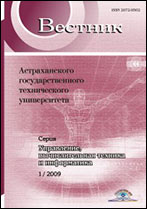|
This article is cited in 1 scientific paper (total in 1 paper)
MANAGEMENT, MODELING, AUTOMATION
Modal control of feeding processes in the medium of state space and wavelet transforms
D. B. Fedosenkova, A. A. Simikovab, B. A. Fedosenkovb
a Siberian Generating Company,
Moscow, Russian Federation
b T. F. Gorbachev Kuzbass State Technical University,
Kemerovo, Russian Federation
Abstract:
The article presents the essential aspects of designing and operational functioning of computer-aided modal control systems, using the example of a control system for feeding processes in а mixture-producing set. The object of study is the structure of feeding devices unit and transient processes during feeding. The subjects of research are the issues of designing and creating a computer-aided modal control system (CMCS) which operates in the mode of tunable parametrically non-stationary in frequency transient processes (TP). In this case, the scalar signals of the feeding devices (FD) material flows are formed in terms of the state space method (in the format of the internal models “input-state-output”), and monitoring of such processes is carried out in the time-frequency wavelet medium. The latter makes it possible to analyze the processes occurring in the CMCS at a semantically transparent and information-saturated level. The parameters (pulse signal off-duty ratios) of the Fourier model for the signals of a discrete-type feeder are presented, on which the nature of the dosing process depends. A model of the feeders unit is formed in terms of the state space. The $1 D$-flow rate signals and their representations in the form of time-frequency distributions ($W$-maps) are considered. A new concept was developed for flow rate modal control of the feeding devices unit in the frame of the mixture-producing set by introducing the definition of parametric non-stationary state of the feeding devices internal environment that takes into account the real-time variation of the multidimensional state feedback coefficient during transients in the system and for the purpose of experimental estimation of transients parameters (here: time constants), they are determined by flow signal distributions on $W$-maps. The wavelet medium used in the system deals with Cohen’s class time-frequency distributions (Wigner–Ville and Choi–Williams transformations). The combination of TP-models in terms of the state space and their representation in the Wigner distribution format allows one to evaluate, set and reassign the parameters of the internal structure of the object controlled (a separate feeder or feeding devices unit) in real time in order to achieve the effect of stabilizing the ingredients flow rate in a rated mode at pre-mixing stage. The transient modes are presented in the form of processes restoring the rated modes (the so-called reverse TP). A procedure has been developed and described for the implementation of a modal control algorithm for the feeding process, including the technology of forced localization and relocalization of the object poles under non-stationary processes in the “Executive mechanism-FD” system, using the example of a continuous-type feeder in a transient mode on load decrease (with a downward reverse transitional process). For this mode, the calculation of the non-stationary matrix of the modal controller is presented.
Keywords:
modal control, transient processes on load increase and decrease, parametrically non-stationary chirp-signals, time-frequency wavelet medium, Wigner distribution, $W$-map, modal controller matrix.
Received: 22.08.2019
Citation:
D. B. Fedosenkov, A. A. Simikova, B. A. Fedosenkov, “Modal control of feeding processes in the medium of state space and wavelet transforms”, Vestn. Astrakhan State Technical Univ. Ser. Management, Computer Sciences and Informatics, 2019, no. 4, 46–58
Linking options:
https://www.mathnet.ru/eng/vagtu600 https://www.mathnet.ru/eng/vagtu/y2019/i4/p46
|

|




 Contact us:
Contact us: Terms of Use
Terms of Use
 Registration to the website
Registration to the website Logotypes
Logotypes








 Citation in format
Citation in format 
